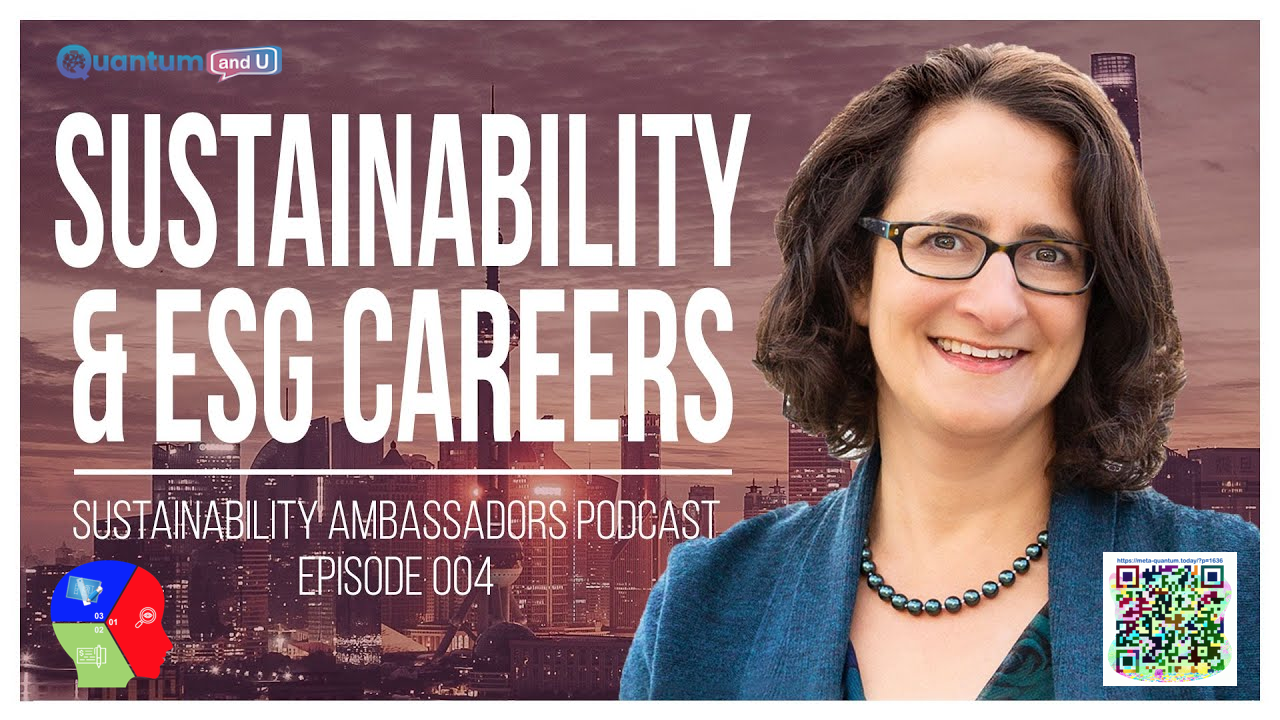
Introduction:
This video is an insightful conversation with Ellen Weinreb, the visionary founder of Weinreb Group, a highly reputable firm specializing in sustainability recruitment. In this interview, the knowledgeable host, Richard, delves into the fascinating world of sustainability and ESG (Environmental, Social, and Governance) careers, uncovering emerging trends and promising opportunities. With her vast experience and profound understanding of the subject matter, Ellen Weinreb provides invaluable insights into the ever-evolving landscape of the sustainability field, shedding light on its current state and future prospects.
Sustainability & ESG Careers: Trends & Opportunities:
The demand for professionals with expertise in sustainability and environmental, social, and governance (ESG) is rapidly growing. This is being driven by a number of factors, including:
- Increasing investor focus on ESG issues
- Growing consumer demand for sustainable products and services
- Regulatory changes requiring companies to report on ESG performance
As a result, there are a wide range of career opportunities available in sustainability and ESG. Some of the most in-demand roles include:
- Sustainability consultant
- ESG analyst
- ESG reporting specialist
- Sustainability manager
- Corporate social responsibility (CSR) officer
- Green jobs (e.g., renewable energy engineer, energy efficiency specialist)
In addition to these specific roles, there is also a growing demand for sustainability and ESG expertise across a range of functions, such as:
- Finance
- Marketing
- Human resources
- Operations
- Supply chain management
Trends in sustainability & ESG careers
A number of trends are shaping the future of sustainability and ESG careers. These include:
- The rise of ESG data and analytics
- The increasing importance of ESG integration
- The growing demand for ESG-related skills
ESG data and analytics
As investors and other stakeholders demand more transparency on ESG performance, there is a growing demand for professionals with expertise in ESG data and analytics. This includes the ability to collect, analyze, and interpret ESG data in order to inform decision-making.
ESG integration
ESG integration is the process of incorporating ESG considerations into investment analysis and decision-making. As ESG becomes more mainstream, there is a growing demand for professionals who can help companies integrate ESG into their investment processes.
Demand for ESG-related skills
In addition to technical skills, there is also a growing demand for professionals with soft skills such as communication, collaboration, and problem-solving. This is because sustainability and ESG work often involves working with a variety of stakeholders, both internal and external.
Opportunities in sustainability & ESG careers
The growing demand for sustainability and ESG professionals is creating a number of opportunities for those interested in this field. These include:
- The opportunity to work on challenging and impactful projects
- The chance to make a difference in the world
- The potential for career growth and advancement
If you are interested in a career in sustainability and ESG, there are a number of things you can do to prepare, such as:
- Gaining relevant education and training
- Developing your ESG knowledge and skills
- Networking with professionals in the field
- Volunteering or interning in a sustainability role
Related Sections:
- Market Trends: Ellen highlights the significant shifts in the sustainability space, such as investors playing a pivotal role, corporations committing to Net Zero, and increasing regulatory frameworks in Europe and the US. These trends are driving growth and opportunities in the sustainability field.
- Evolving Roles: Companies are seeking sustainability specialists, particularly in areas like Net Zero and scope three emissions reporting. Smaller companies are also hiring their first sustainability leaders, indicating a broadening demand for sustainability professionals.
- Entry Points and Education: Ellen discusses the evolving landscape for sustainability career entry. It is becoming easier for newcomers to land corporate sustainability roles, as consulting firms are hiring heavily. Business schools and certification programs, like those from GRI and CFA, are offering opportunities to gain relevant expertise.
- Specializations: The video touches on the diverse skill sets needed in sustainability careers. It’s not limited to technical experts; generalists who understand supply chains and stakeholder dynamics are also in demand. The regulatory environment and market demand play significant roles.
- CSO Roles: The Chief Sustainability Officer (CSO) position is discussed. Ellen notes that CSOs often have deputies responsible for operationalizing sustainability initiatives. Cross-functional work streams within companies help operationalize sustainability goals.
- Salary Insights: Salary trends for sustainability roles are examined. VP-level salaries are increasing, while director and manager levels remain relatively stable. The video outlines typical compensation packages for these roles.
- CSO Research: The video highlights research findings on the growth of CSO positions in publicly traded US companies. The number of CSOs has significantly increased, signaling a growing commitment to sustainability.
Conclusion with Takeaway Key Points:
The sustainability and ESG career landscape is currently dynamic and full of opportunities. Key takeaways include:
- Sustainability and ESG roles are on the rise due to investor influence, regulatory changes, and corporate commitments to sustainability.
- Entry points for sustainability careers are expanding, with more opportunities for newcomers, especially in consulting firms and business schools.
- There’s a demand for both technical specialists and generalists who understand supply chains and regulatory environments.
- CSO positions are growing, indicating a stronger commitment to sustainability at the highest levels of organizations.
- Salaries are increasing, particularly at the VP level, making sustainability careers financially attractive.
References:


